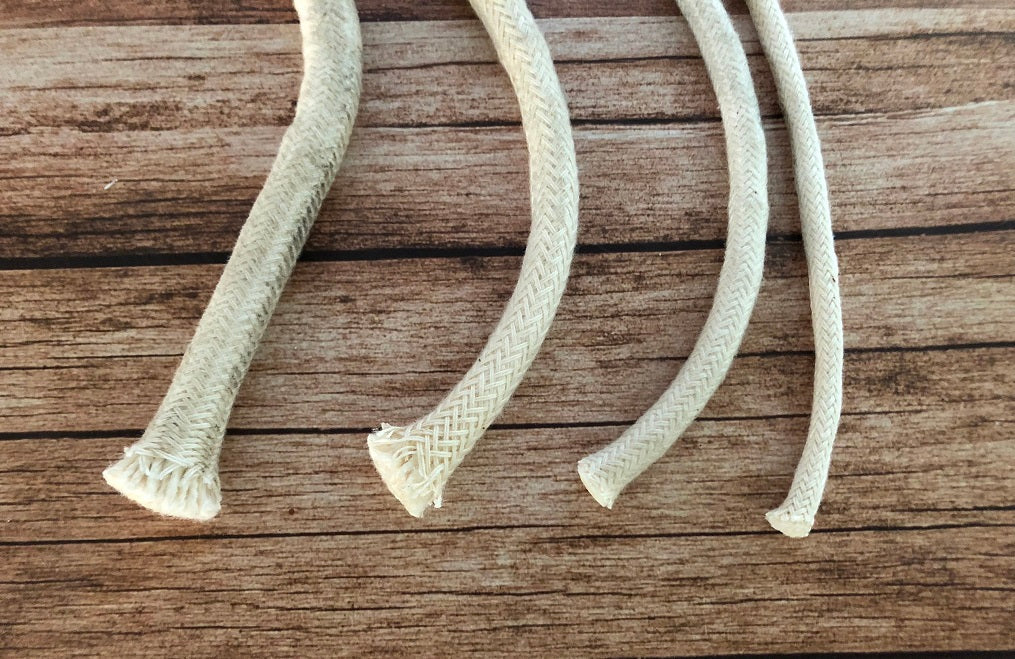
7 - Wick choice
Choosing the right wick for a beginner candlemaker isn't always easy. Even experienced candlemakers struggle with this issue from time to time. Several factors play a role in candlemaking, and they all contribute to achieving the desired result.
Wicks, also called wicks or fuses, are made of cotton, at least the better quality wicks.



Types of blades:
- Flat wick, reinforced: used for multiple candlemaking applications. Suitable for poured and dipped candles.
- Waxed wick: especially suitable for candles in glass and jars.
- Outdoor wick : The thicker wick is only suitable for outdoor use. Due to the size of the wick, the candle will be difficult to extinguish, even in higher wind gusts, such as 6 Beaufort, which our wicks have been tested to.
Factors that determine the right wing:
- Cross section (Ø candle)
- Used paraffin
- Shape of the candle
- Additional additives such as colorants and fragrances.
Many factors must lead to that one 'right' wick or fuse for your candle(s).
Below is an overview of problem candles with corresponding explanations and solutions:

Cause: Smoke (haze) may indicate a wick that is too large. Another reason could be that the wick is twisted in the candle.
Solution: Use a thinner wick. When tightening the wick, pay extra attention to ensure it isn't twisted.

Cause: The candle is running, also called dripping. The wick is probably too small. Extinguishing while burning is also a possible consequence.
Solution : Choose a thicker wick. Is the candle standing upright? Drafts can also cause dripping. This is especially common with dipped candles that are dipped irregularly.

Cause: When burning the candle, the flame remains unusually small. This can be caused by additives such as dye, fragrance, or impure (recycled) paraffin. The candle is trying to process the paraffin, but due to an overabundance of additives, the candle burns at a low flame.
Solution: Use a larger wick. Adjust additives such as food coloring or fragrance.

Cause: Irregular wick burning. This could be due to excessive impurities.
Solution : Use paraffin from European distributors who adhere to the guidelines for recognized compositions. The wick may also be twisted in the candle, as mentioned earlier.

Cause: White ash residue around the end of the wick. This could be due to excessive impurities in the candle.
Solution: Use pure products for indoor candles and apply the wick as previously mentioned.
Article. Application
Flat wing, reinforced.
Wick 3 x 4 Immersion candles ø 10-20 mm - Casting molds ø up to 20 mm
Wick 3 x 6 Immersion candles ø 10-25 mm - Casting molds ø up to 30 mm
Wick 3 x 8 Immersion candles ø 25-38 mm - Casting molds ø up to 40-65 mm
Pit 3 x 10 Immersion candles ø 40-50 mm - Casting molds ø up to 60-80 mm
Pit 3 x 12 - Casting molds ø up to 80-90 mm
Pit 3 x 14 - Casting molds ø up to 90-100 mm
Pit 3 x 16 - Casting molds ø up to 90-110 mm
Pit 3 x 18 - Casting molds ø up to 100-120 mm
Multi-purpose immersion candles Ø 10-50 mm - Casting molds Ø up to 50 mm
A candle is defined by its wick (diameter) and the volume of the candle. The specified diameters are only an indication of the intended final product. Making a test candle before final production is recommended.
Article Application
Wax wicks
TL wax wick, floating candles and tea lights (3.5 cm)
TL wax pit, casting molds and pots ø 4 - 6 cm (7-10-15-20 cm)
TL wax pit, casting molds and pots ø 5 - 7 cm (7 cm)
TL wax pit, casting molds and pots ø 6 - 8 cm (10-15-20 cm)
TL wax pit, casting molds and pots ø 8 - 10 cm (10-15-20 cm)
Length
3.5cm - 7cm - 10cm - 15cm - 20cm
Wax wicks are of a self-chosen length which are provided with a layer of wax and a metal wick base.
Ideal for making tea lights or filling glasses and jars.
Article Application
Outdoor seeds
2mm outdoor wick for small outdoor candles
Outdoor pit 3mm torches + pots up to 9 cm
Outdoor pit 4mm pots up to 15 cm
Outdoor pit 5mm pots up to 18 cm
Outdoor pit 7mm pots > 18 cm
Outdoor pit 9mm pots > 25cm
Outdoor wicks are designed to absorb wind gusts while burning and maintain a burning flame. They have sufficient capacity to burn large candles thoroughly.

